Jason Ringenberg - Interview
by John Clarkson
published: 16 / 4 / 2007
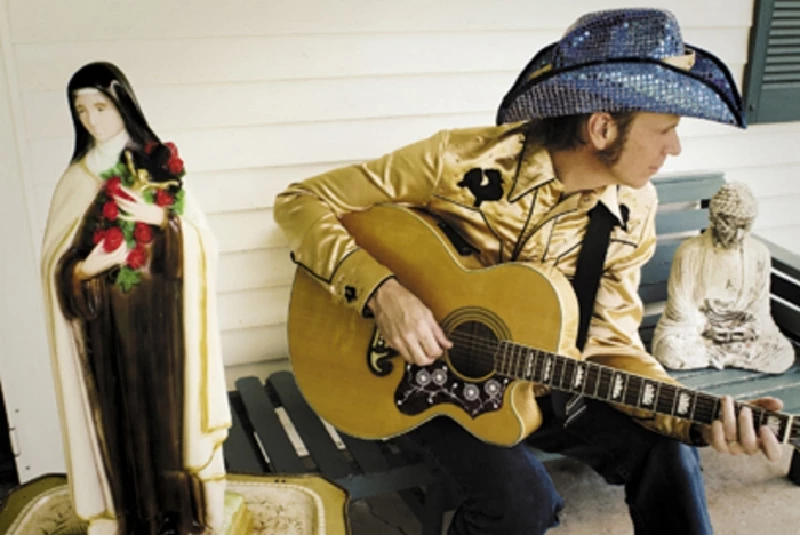
intro
The former frontman with cowpunk pioneers Jason and the Scorchers, Jason Ringenberg currently runs both a solo career and also one for one children under the moniker of Farmer Jason, He speaks to John Clarkson about trhe Scorchers, his non-stop touring schedule and his present work
Jason Ringenberg has a temperature of 104°. The 48 year old former leader of the groundbreaking Nashville group Jason and the Scorchers is in the midst of a 10 day British tour, and has somewhere in its early stages picked up a raging, vicious bout of flu. Ringenberg has over the decades garnered a reputation for fieriness in both his eviscerating live performances with the Scorchers and as a solo act, and across a set of blistering studio albums. With several days left yet of afternoons playing children’s shows as Farmer Jason and then evenings to adults under his own name, he is showing a similar grittiness to being ill. He has never in 30 years as a performer cancelled a show and he has no intention of starting now. As Pennyblackmusic will discover, he is determined to get around feeling lousy by simply bypassing it. Massively influential, Jason and the Nashville Scorchers, as they were initially known, were the original pioneers of the cowpunk movement, and the first group to fuse together punk and country. The Nashville Scorchers, which, as well as Ringenberg (lead vocals and guitar), also consisted of Warner Hodges (lead guitar), Jeff Johnson (bass) and Perry Baggs (drums), and released their debut single, ‘Restless Country Soul’ on their own Praxis Recordings in 1982. They followed this with another Praxis release, a six song mini album, ‘Fervor’, in 1983, which attracted the praise of various critics and also eventually several labels, including EMI, who signed the group the following year. With the band changing its name to Jason and the Scorchers, ‘Fervor’ was re-released again later that year in an expanded edition to modest sales but massive critical acclaim, and paved the way for other bands as diverse as the Long Ryders, the Meat Puppets, Uncle Tupelo, Social Distortion and Wilco, whom all would also go on to similarly merge punk with country. The Scorchers released three other albums in the 80’s, ‘Lost and Found’ (1986), ‘Still Standing’ (1988), and, after they were dropped by EMI, ‘Thunder and Lightning’(1989) on A & M. As the decade progressed, they, however, began to move further and further away from their country roots. ‘Thunder and Lightning’ in particular had a strong metal influence, and there was a brief stage in which the Scorchers wore make up on stage. With Perry Baggs having being diagnosed as suffering from diabetes, the Scorchers, after years of hard touring and having too now lost their A & M deal, broke up in 1990. Ringenberg released a solo album, ‘One Foot in the Honky Tonk’(Capitol) in 1992, before the Scorchers then started up again in the mid 90’s. They would go on to release on Mammoth Records another two studio albums, ‘A Blazing Grace’ (1995) and ‘Clear Impetus Morning’ (1996), both of which had a strong country element, as well as a live album, ‘Midnight Roads and Stages Seen’ (1998). With the Scorchers having fallen into hiatus again at the end of the 90’s, Ringenberg has since then focused on his solo career. In between bouts of regular touring, he has recorded on his own Courageous Chicken Music label two further solo albums, ‘A Pocketful of Soul’ (2000) and ‘Empire Builders’ (2004), and also ‘All Over Creation’(2002), a collection of duets which found him collaborating with other acts including Hammell on Trial, Kristi Rose, Steve Earle, Todd Snider, the Wildhearts and Lambchop. In what has been commercially the most successful venture of his long career, he has also created a children’s character, Farmer Jason, with whom he also tours regularly. Ringenberg’s “twin brother” released his debut album, ‘A Day at the Farm with Farmer Jason’ in 2003. A second Farmer Jason album entitled ‘Rockin’ in the Forest with Farmer Jason’ is due out as a joint release between Courageous Chicken Music and Laughing Outlaw in May. In conversation with Pennyblackmusic in a pre-arranged phone interview, Ringenberg is good-humoured, thoughtful and funny, and courteously appreciative of our time. It is only when he bursts into a sputtering fit of harsh coughing a few minutes into the interview that he admits that he has not been well the last few days. His unfussy intent to carry on against the odds is such that it is later still in the week, when I am in touch with his PR in a follow-up e-mail, that I find out how sick he has really been. As he talks to us about his years with the Scorchers, his solo career since then, Farmer Jason and his almost non-stop schedule of his touring, Jason Ringenberg even in illness shows the same unwavering determination and dedication that throughout his musical career that he has always done. PB : You were brought up in Illinois. Your first band, which you formed when you were still there, was a group called Shakespeare's Riot. Who were they ? JR : We were a college band. We recorded a few demo tapes, but we never got out of southern Illinois. We had a lot of fun though. That's for sure. PB : You then moved to Nashville in the early 80's. Was that with the intention of forming a band or did you move to Nashville for work reasons ? JR : I came to Nashville with the expressive purpose of becoming a star (Laughs). That was it. That was my sole purpose. PB : That was very ambitious for someone who was only in his early 20's at the time. JR : Yeah, those were ambitious times. When you're that age you don't really see any barriers, and I sure didn't. I was gung ho and ready to go. PB : The Scorchers were the first band to merge country and punk. You grew up listening to musicians such as Hank Williams and Gram Parsons. At what stage did you first get into punk ? JR : My little brother was pretty much into punk from the get go and I got into it through him. That would have been probably about '79 or '80. PB : How long after that did you form the Scorchers ? JR : I came to Nashville in July '81, July 4th actually, and we started the band off right away. I was in the right place at the right time, and I put together with some other guys an early line-up of Jason and the Nashville Scorchers. They weren't the same guys that became the band, but through that group Warner and Perry and Jeff saw me. They then got on board. PB : Did Warner, Perry and Jeff come from a country or a punk background ? JR : They came from a punk background, but they also understood country music. Warner, for example, had played music with his parents a lot, who were country musicians, and they had had a little country band together. Perry had pretty deep roots in country and gospel music, and Jeff understood country music in the way that Keith Richard understood country music. When I met them, those guys were rockers though. They wanted nothing to do with country music. They wanted to rock. I was no George Straight. I was a rocker too, but the sort of extreme rock 'n' roll where those guys were coming from created a chemistry. PB : The Scorchers recorded their first EP, 'Reckless Country Soul', 10 days after they played their first gig and then released it a fortnight later on their own Praxis Recordings. That was very fast. Was that remarkable at the time or was that just the way things were in Nashville in those days ? JR : I wouldn't say it was the way things were in Nashville, but it was the way things were in the new wave/alternative rock scene of the south. If you had a band, you could get a 7" out pretty quick. Our manager, the fifth Scorcher, Jack Emerson, thought that it was important to document that the band was the first group to do this sort of thing. He, therefore, thought we should get a record out. PB : I would imagine that the Scorchers in those early days were the sort of band that people loved and hated in equal measure, and which nobody who heard them was apathetic about. JR : Now a band like us would come out and it wouldn't make that big a difference, but in those days what we were doing was really radical and folks got pretty radical about how they felt about the band. There was no question about that. PB : Did you have a really fanatical following then from the outset ? JR : From the immediate get go we had a totally fanatical following. People would put us up in their houses and cook us dinner and paint flyers for us and take care of us. In those days we used to ride around in an old 1969 car, which was broken down just about most of the time, but people would help us out there too. There was an army of guardian angels around us (Laughs). We never missed a show. We always made our gigs and we built up these little followings in all these little towns across the south and mid West. PB : You had an especially good relationship with REM during those early years, didn’t you ? JR : I haven't had much to do with them for the last twenty years or so, but in the early days we played the same rooms and we did shows all together the time. They gave us a lot of support and we helped them out too in the early days. We would stay in their houses and vice versa. They are a wonderful bunch of people and very unselfish. PB : And finally you signed to EMI in 1984. How did that come about ? JR : We started making some noise. We put out the 'Fervor' EP and that got reviewed in 'Rolling Stone'. We started getting a little airplay here and there and showing up on critics' lists for best records for '83. We made a trip out to Los Angeles, and by the time we got to Los Angeles all the record companies were chasing us. PB : You dropped the name of the Nashville Scorchers shortly afterwards. Was that something which EMI put you up to do ? JR : Absolutely. We would never have done that on our own. Looking back on it now it was a huge mistake, but it didn't seem that way at the time. It was though. It really infuriated a lot of our fans. PB : It seemed that the Scorchers had lost their way by the time of the 'Thunder and Fire' album and their original split. Is that something you would agree with ? JR : Absolutely ! I think we began to lose our way before then at the time of ‘Still Standing’ in '86. '86, '87, '88 and '89 were the years in which we did those two records and toured them. The band had essentially lost all connection to what we had started out as being. The music business line on the band was that, if we were to get rid of our roots, and our country side, then we would become more commercial. It was the exact opposite though. We ended up losing our soul and also selling less records. That definitely contributed to the decline of the band. Then Perry Baggs got sick and we lost our deal. All those things combined to throw the band into its first break-up. PB : You weren't really apart that long though ? JR : It was about three years. PB : How did you get back together again ? JR : Jeff, our bass player, was the one who did it. He started calling us and bugging us until we decided to go back and do a few reunion shows and it grew from there. We had a pretty good run in the 90’s. I think we made pretty good music during that second period. PB : Why did the band split up again at the end of the 90's ? JR : We never officially split. We are still nominally together. Jeff left again. He got tired of the music business. It wasn't anything personal. We were able to replace Jeff and things were okay, not great, but okay after that, but then Perry started to get sicker and sicker and he couldn't do it anymore and that was the blow we never have really come to terms with. We have done a few shows here and there, but without Perry there really is no band. But we have never really admitted that officially. PB : You went solo in 1999. Your albums have featured other musicians but you tour by yourself. Why do you play without a band ? Is it just a cost effective thing ? JR : Economics is certainly a part of it, but even more so I needed to do something as different as possible from Jason and the Scorchers. There is no way I could go out with a band and not be compared to Jason and the Scorchers, so I started out as a singer-songwriter, but really hit it with a lot of energy, so that on stage I was this lunatic, crazy solo guy rock 'n' rolling on guitar. I thought that maybe that would work, and I have done pretty well with it. I am pretty happy with the way things are now. PB : Did it feel odd at first going out alone ? JR : It did. I really missed the energy of the band, but now I am totally happy. I have a lot of fun doing it. PB : Jason and the Scorchers records are pretty hard to get a hold of. The majority are now unavailable. How would you recommend to newer fans or people wanting to perhaps upgrade from record to CD that they get a hold of them ? JR : That's really sad. Over the years we have tried to get reissues out, but it has just never been happened. The sales level is just too small for a label like Capitol or Polygram which owns the rights to the records to do it, so they just don't bother. It is nothing personal. You can sometimes find our albums on Amazon and places like that, but they are used CDs. I also have some Scorchers records for sale through my website at www.jasonringenberg.com which I have had around for a long while. PB : Your records seem to have got more political, or at least your grown-up albums have, in recent times. Is that just a reflection on a man getting older ? You've got beyond singing about cars and girls. JR : That is part of it, but it is more than that. I have never really been all that political a person. Politicians are politicians to me. I accept them for what they are and what they are not, but I couldn’t look at what has happened in the States during the last eight years or so, and not say something about it because it is just staggering to me the monumental stupidity of these people and what they are putting our country through. I just had to talk about it because it is just heartbreaking for me to watch the mistakes these people have made, and to see their arrogance and stupidity. It is unbelievable to me that these people have done the things that they have done. PB : You play a massive amount of shows each year You have played 300 shows in the last eighteen months alone. Is touring something you ever tire of ? JR : I play a lot. I have got a family to take care of, and I need to play to support them, but beyond that I am a performer. More than a recording artist, I am a performing artist, so if I get off for a couple of weeks I start feeling kind of weird (Laughs). I feel I have got to get back to doing what I am supposed to be doing. Even if I had made a bunch of money from records sales alone I would probably still tour because I just love it so much. I think that it is really cool, although possibly I wouldn’t do quite so many shows. PB : Why did you decide to adopt the Farmer Jason persona? JR : That's been the big story lately. It's been unbelievably cool. I put together this extension of myself four years ago just for fun. My two little daughters were really young and listening to kids' music and I thought it would be really cool to do a little record for them, so they could sit and listen to Daddy as I am out on the road so much. It has just grown since then. In the States I am definitely doing way more business as Farmer Jason. PB : One of the things you have been doing is Farmer Jason and kids' shows in the afternoons when you play a town and then Jason Ringenberg shows at night. Do you find it easy slipping in and out from being Farmer Jason to Jason Ringenberg rock star? JR : Yeah, that's no problem at all. The only time I have a problem with that is when promoters want me to do both of them at the same show. That is harder to do, but I am able to step into the character of both of them very easily now. I often now close a Jason Ringenberg set with a Farmer Jason song. 'The Tractor Goes Chug Chug Chug' and 'Punk Rock Skunk' both destroy audiences. They love it. PB : One of the aims of the character as well as entertaining children is to educate them with thoughts about nature, ecology and the environment. You were brought up on a hog farm in Illinois and now live on another farm near Nashville. Does your interest in nature stem from that ? JR : I suppose so. I have always loved nature. I always did. I enjoy farm life as much as I love actual farming because it puts you in this place where you are very close to nature. You would find me a lot when I was a boy outside walking, farming, fishing, hunting, canoeing and camping, and enjoying nature in every way possible. It has been just fantastic to make a record that talks admittingly in a goofy way about things I enjoyed doing when I was a child. PB : Last few questions ! Jason and the Scorchers are about to reform for a one off gig in Nashville in June. Why have you decided to do that ?. JR : It is a benefit gig for Perry Baggs. Things have really worsened for Perry in the last six months, and he's been in the hospital almost non-stop for the last three months. He has had kidney failure and various other problems. We hoped that maybe he would even play for us on the night, but it is not looking like now like that is going to happen. He is going to be there though, and will maybe sing with us. It doesn't look like the band, however, will ever get back together for real. PB : You've also recently recorded a track for a Clash tribute album, ‘The Sandinista Project’, which features covers of all the songs from the ‘Sandinista’ album, and which is coming out on 00.02:59 Records. Which song have you contributed to that ? JR : It’s ‘Ivan Meets GI Joe’. Jimmy Guterman, who runs that label, is a friend of mine and asked me to contribute a track. All my life I have taken country songs and turned them into rock 'n' roll songs. It was really fun to take a rock song and make it into a country song, which is what we did here. We did it as a male/female duet, and I had this great singer, Kristi Rose, do the female part. It was just wonderful. PB : At the moment you're touring Britain. You’re also doing the Jason and the Scorchers gig. What other plans do you have for the immediate future ? JR : I am going to be working at playing live a lot and as much as possible. We’re also developing some TV ideas with regard to Farmer Jason and we'll start pitching them around all the major power people to see if we can get someone interested in putting them on TV. That's the next creative process we're going to do, but beyond that I'm touring a lot and playing a lot of shows this summer. PB : Will you bring out another Jason Ringenberg album soon? JR : I am going to be doing a 'Best of Jason' double CD of my solo work, and Laughing Outlaw is going to be putting that in the UK and Australia. That is going to be out this Fall. PB : Things sound then like they are really busy. JR : Yes, but that is how I want it though. That is for sure. PB : Thank you very much for your time. It's been a pleasure talking to you.
Band Links:-
https://jasonringenberg.com/https://www.facebook.com/jasonringenbergmusic
https://twitter.com/jasonringenberg?lang=en
Have a Listen:-
Picture Gallery:-
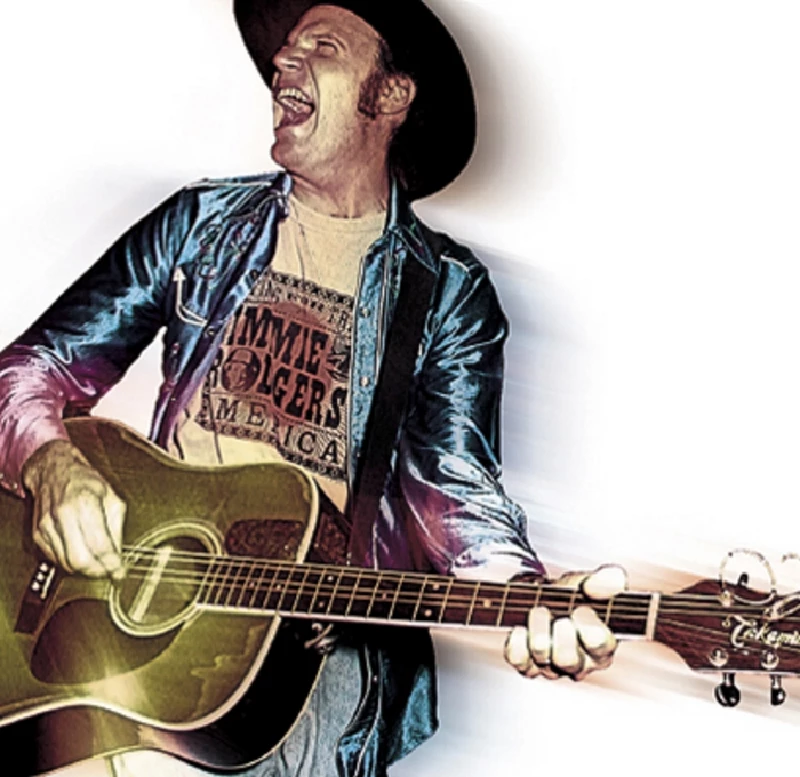
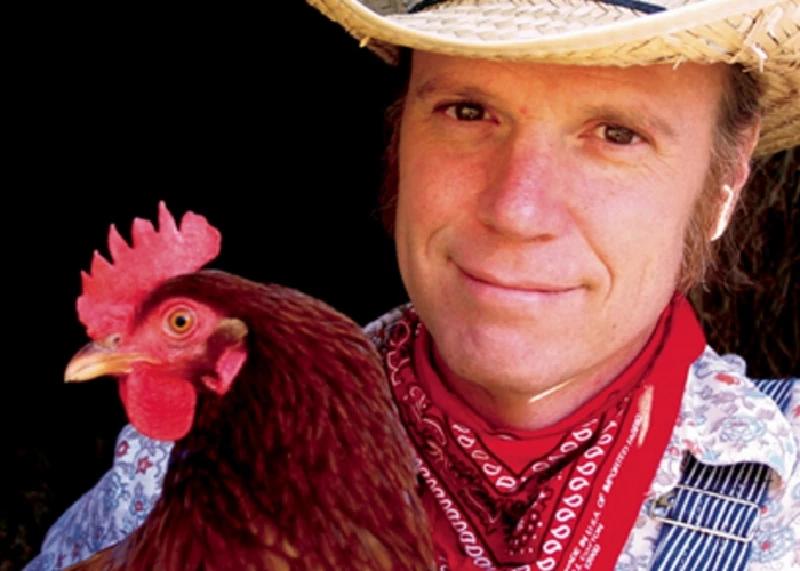
interviews |
|
Interview (2021) |
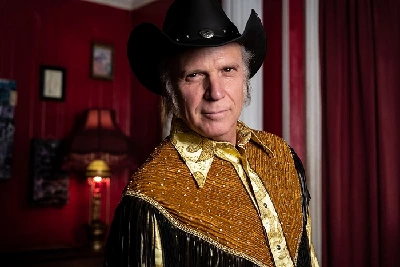
|
| Hailed as ‘The Godfather of Americana’, US roots rock musician Jason Ringenberg recently issued new solo LP ‘Rhinestoned’ to outstanding praise. Julie Cruickshank caught up with the alt. country pioneer to chat about the making of the album and formative influences |
reviews |
|
Rhinestoned (2021) |
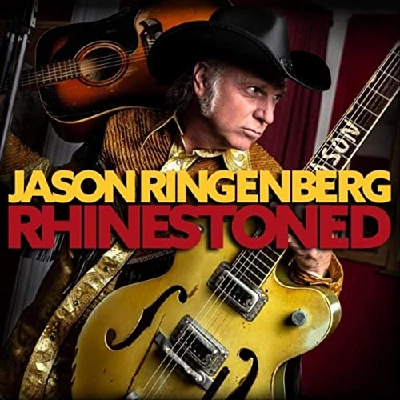
|
| Highly enjoyable solo effort, which was recorded during the 2020 Covid lockdown, from Tennessee’s Jason Ringenberg, one of the early pioneers of alt. country |
| Stand Tall (2019) |
| Best Tracks And Side Tracks 1979 - 2007 (2008) |
most viewed articles
current edition
Carl Ewens - David Bowie 1964 to 1982 On Track: Every Album, Every SongArmory Show - Interview with Richard Jobson
Colin Blunstone - Thalia Hall, Chicago, 16/7/2025
John McKay - Interview
Visor Fest - Valencia, Spain, 26/9/2025...27/9/2025
Bathers - Photoscapes 1
Billie Eilish - O2 Arena, London, 10/7/2025
Loft - Interview
Robert Forster - Interview
Sir Tim Rice - Interview
previous editions
Heavenly - P.U.N.K. Girl EPManic Street Preachers - (Gig of a Lifetime) Millennium Stadium, Cardiff, December 1999
Beautiful South - Ten Songs That Made Me Love...
Oasis - Oasis, Earl's Court, London, 1995
Prolapse - Interview
Coldplay - Wembley Arena. London, 16/8/2022
Boomtown Rats - Ten Songs That Made Me Love....
Peter Perrett - In Dreams Begin Responsibilities Interview Part One
Trudie Myerscough-Harris - Interview
Pixies - Ten Songs That Made Me Love...
most viewed reviews
current edition
Sick Man of Europe - The Sick Man of EuropeAmy Macdonald - Is This What You've Been Waiting For?
Davey Woodward - Mumbo in the Jumbo
Lucy Spraggan - Other Sides of the Moon
Phew, Erika Kobayashi,, Dieter Moebius - Radium Girls
Suzanne Vega - Flying With Angels
Bush - I Beat Loneliness
Blueboy - 2
Alice Cooper - The Revenge of Alice Cooper
Cynthia Erivo - I Forgive You
Pennyblackmusic Regular Contributors
Adrian Janes
Amanda J. Window
Andrew Twambley
Anthony Dhanendran
Benjamin Howarth
Cila Warncke
Daniel Cressey
Darren Aston
Dastardly
Dave Goodwin
Denzil Watson
Dominic B. Simpson
Eoghan Lyng
Fiona Hutchings
Harry Sherriff
Helen Tipping
Jamie Rowland
John Clarkson
Julie Cruickshank
Kimberly Bright
Lisa Torem
Maarten Schiethart